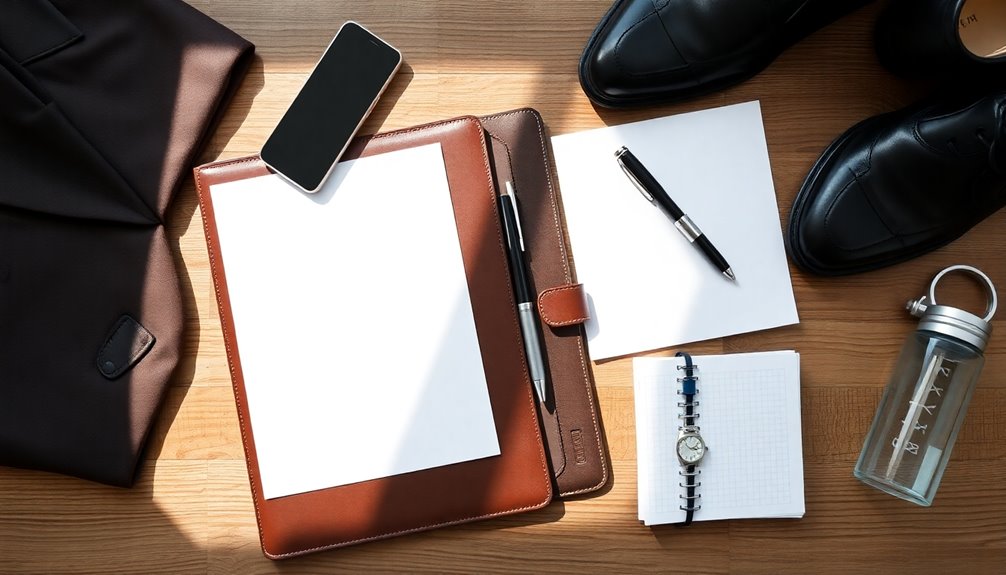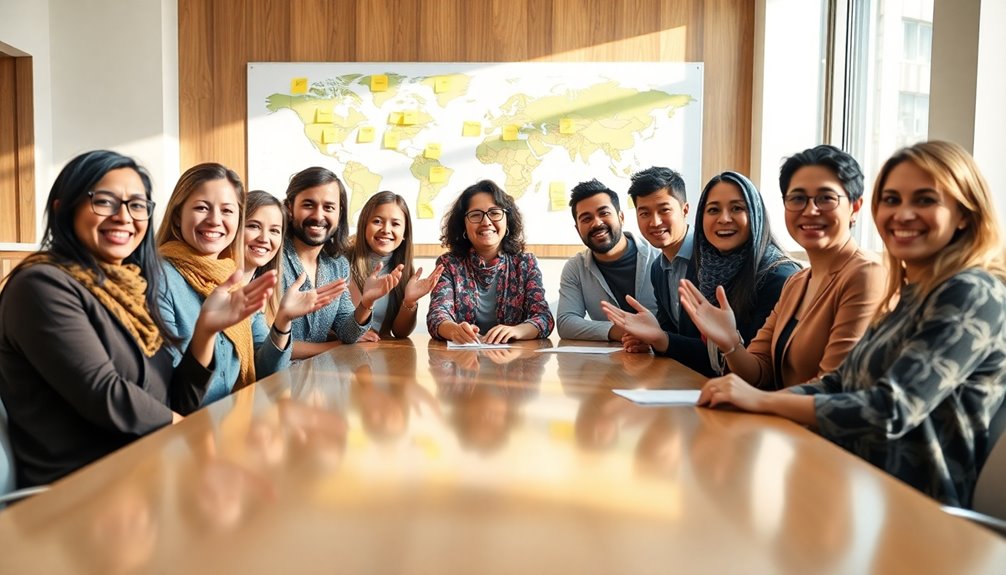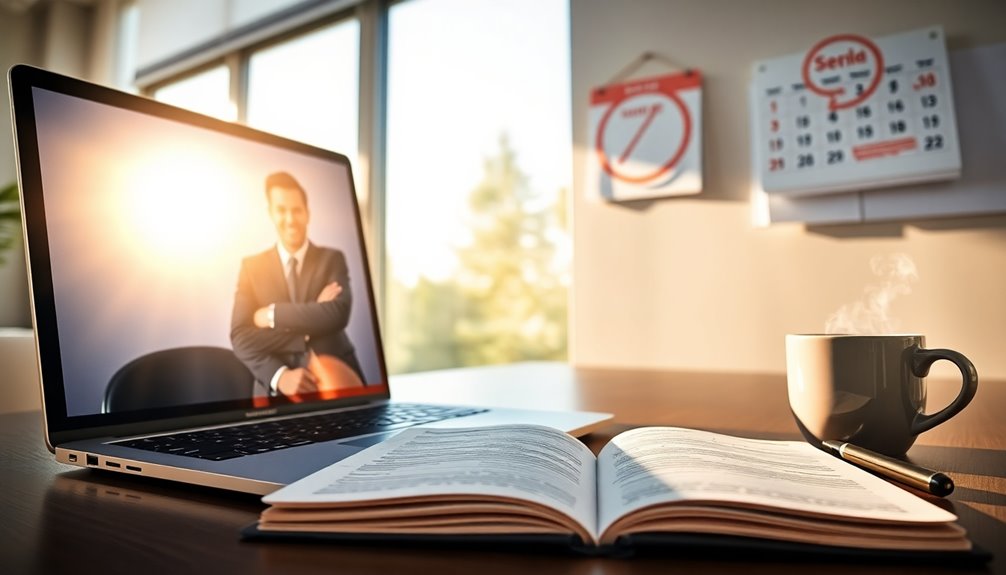To nail your job interview, you need to bring key essentials that highlight your professionalism. Start with multiple printed copies of your resume and a tailored cover letter. Include a list of references and any relevant certifications neatly organized in a folder. Don't forget your portfolio showcasing work samples. Carry a valid ID for security checks, and know the office address and contact information. Prepare thoughtful questions for the interviewer, and remember to walk in with confidence and a positive attitude. These essentials will set you up for success, and there's even more you could consider before your interview.
Key Takeaways
- Bring multiple printed copies of your resume to share with interviewers.
- Include a tailored cover letter specifically for the position you're applying for.
- Prepare a list of professional references with their contact information readily available.
- Carry a portfolio showcasing relevant work samples or projects to demonstrate your capabilities.
- Have a valid government-issued ID for security checks at the interview location.
Preparation Essentials
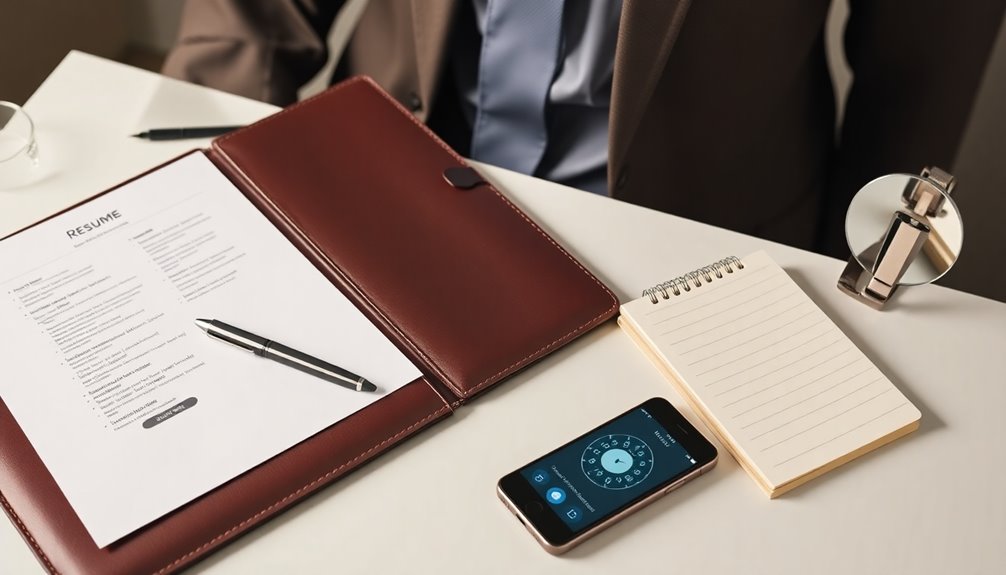
Preparation is key to acing your job interview. You want to guarantee you've got all the essential items to make a great impression. Start by creating a checklist of documents to bring, including any important documents like identification, references, or certifications relevant to the role. This proactive approach minimizes the chance of forgetting something critical.
Next, immerse yourself in interview preparation by researching the company and the specific role you're applying for. This not only showcases your genuine interest but also helps you align your skills with what they need. Practicing common interview questions is essential, too. It'll allow you to articulate your experiences and skills confidently, making you stand out.
Don't overlook your attire; planning what you'll wear in advance is a smart move. Dressing appropriately can markedly impact the first impression you make. Finally, review general interview tips to boost your confidence and enhance your overall performance. By focusing on these preparation essentials, you position yourself for success and demonstrate your commitment to the opportunity at hand.
Hard Copy of Resume

A hard copy of your resume is an essential element to bring to your job interview. It shows professionalism and guarantees that every interviewer has access to copies of your resume during your discussion. Don't just bring one; have multiple printed copies ready. This way, you can confidently share them with each person you meet.
Here are three key tips for your printed copies:
- Keep it updated: Make sure your resume is tailored specifically for the job you're applying for. Highlight relevant skills and experiences to catch the interviewer's attention.
- Use a protective folder: Store your resumes in a protective folder to keep them flat and free from damage. This not only protects your documents but also enhances your professionalism.
- Format for readability: A well-formatted resume enhances readability, making it easier for interviewers to reference your qualifications during the interview.
Having these printed copies ready can make a significant difference in how you're perceived, so don't overlook this important step!
Certificates
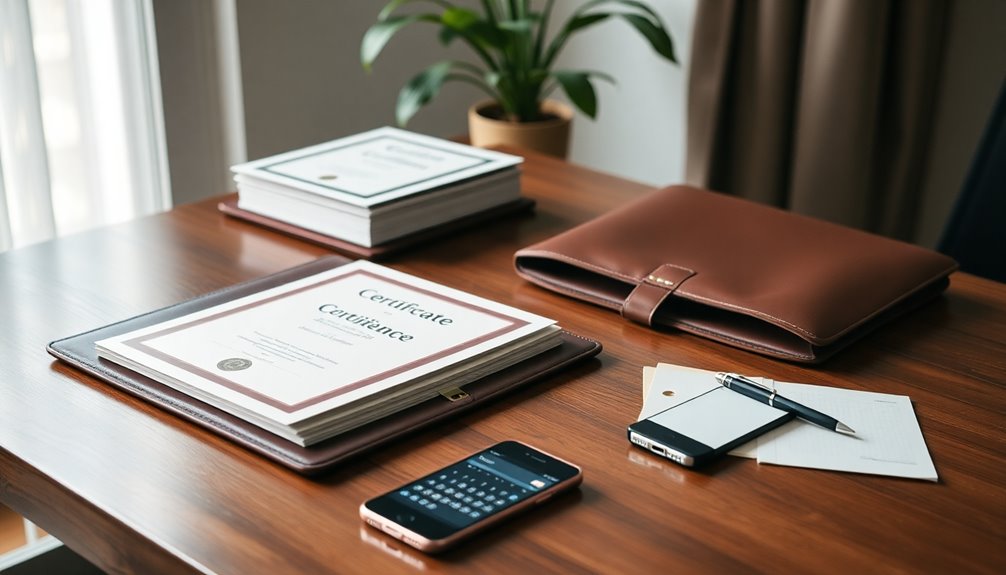
When you're heading to an interview, make sure you organize your relevant certificates in a protective folder for easy access. Highlight the key qualifications and achievements linked to each certificate, so you can effectively showcase your expertise. This preparation not only reinforces your fit for the role but also boosts your credibility in the eyes of the interviewer.
Organizing Relevant Certificates
Organizing your certificates in a protective folder not only keeps them in pristine condition but also makes them easily accessible during your interview. This preparation reflects your professionalism and attention to detail, which can set you apart from other candidates. Make certain you carry both original certificates and copies, as interviewers may request to see them for verification of your qualifications.
Here are three tips for effectively organizing relevant certificates:
- Group by Relevance: Arrange your certificates based on their relevance to the job you're applying for. This makes it easier to present them during the discussion.
- Check Expiration Dates: Before your interview, verify all certifications are current and up-to-date. Outdated certificates may raise questions about your commitment to continuous learning.
- Be Ready to Discuss: Prepare to explain how each certificate contributes to your skills and experiences. This will reinforce your qualifications and demonstrate how you can add value to the position.
Highlighting Key Qualifications
Your certificates can greatly bolster your qualifications during a job interview, so it is essential to highlight them effectively. Start by carrying only the relevant certificates that are explicitly listed on your resume. This validates your qualifications and demonstrates your expertise. Organizing these certificates in a protective folder guarantees they stay in good condition and are easily accessible when needed.
During the interview, be prepared to present your certificates and discuss how they relate to the position. This is your chance to showcase key qualifications that set you apart from other candidates. You might mention specific skills or knowledge gained through these certifications, linking them directly to the job requirements.
Additionally, it's wise to keep copies of any important certifications on hand. This provides extra proof of your credentials if the interviewer requests further documentation. Having your certificates ready not only reflects your preparedness but can also positively influence the interviewer's perception of your qualifications. Remember, being well-prepared demonstrates your commitment and professionalism, making a lasting impression during your interview.
Portfolio

Your portfolio is a key tool in showcasing relevant work samples that highlight your skills for the job. Make sure it's organized so interviewers can easily navigate through your pieces during the conversation. Tailor your selection to match the specific role, emphasizing your strengths and experience.
Relevant Work Samples
A well-curated portfolio can make a significant difference in how you present your qualifications during a job interview. To impress potential employers, focus on including relevant work samples that truly showcase your skills and experiences aligned with the job role. Customizing your portfolio not only highlights your understanding of the position but also emphasizes your most pertinent achievements.
Here are three key items to include in your portfolio:
- Diverse Work Samples: Select a range of projects that demonstrate your capabilities. This could include reports, designs, or presentations relevant to the job.
- Testimonials and Positive Feedback: Incorporate quotes or letters from previous clients or employers. This validates your skills and shows that you've made a positive impact in past roles.
- Clear Explanations: When discussing each piece, articulate your thought process and the results achieved. This helps interviewers understand your work's significance.
Organizing these elements neatly will make it easier for interviewers to navigate. Practicing how you present these works will boost your confidence and leave a lasting impression.
Organized Presentation Style
When showcasing your portfolio, an organized presentation style can make all the difference in how your work is perceived. Start by structuring your portfolio into clear sections or categories. This organization allows interviewers to quickly navigate through your samples, highlighting your best work without any hassle.
Include a variety of projects that demonstrate your skills and accomplishments relevant to the job you're applying for. Each section should have a compelling introduction that outlines what the samples represent, making it easier for the interviewer to understand your capabilities.
As you present your portfolio, practice discussing each piece confidently. Focus on key achievements, challenges you overcame, and the impact of your work on previous projects or companies. This not only showcases your skills but also your ability to communicate effectively.
Consider adding positive feedback or testimonials from past clients or employers to enhance your credibility. By presenting your portfolio in an organized manner, you're not just showing your work; you're telling a story about your professional journey, making a lasting impression on your potential employer. Additionally, integrating digital creativity into your portfolio presentation can further demonstrate your adaptability and innovative problem-solving skills.
Tailored to Job Role
Tailoring your portfolio to the specific job role can greatly enhance your chances of making a strong impression during an interview. A well-organized portfolio is vital, especially for creative positions, as it showcases your skills and relevant work samples that align with the job requirements.
To effectively tailor your portfolio, consider including the following:
- Relevant Work Samples: Choose projects that best represent your abilities and relate directly to the job description. This could be design projects, writing pieces, or photography.
- Variety of Skills: Demonstrate your versatility by including a mix of work samples. This helps interviewers see your range and creativity.
- Clear Presentation: Make certain your portfolio is neat and easy to navigate. This reflects your professionalism and attention to detail.
Practice discussing each piece confidently, explaining your thought process, techniques used, and the impact of your work. By tailoring your portfolio specifically to the role, you not only highlight your qualifications but also show your genuine interest in the position. A tailored portfolio can be your key to standing out in a competitive job market.
Prints of Documents

Bringing multiple copies of crucial documents to your job interview is imperative, as it guarantees that all interviewers have access to your information. You should prepare prints of documents like your resume when you applied, cover letter, and any relevant experience letters or certifications. Having these materials on hand not only shows your professionalism but also demonstrates your attention to detail.
Organize all your prints in a neat folder, making it easy for you to access them during the interview. This organization reflects positively on your candidacy and allows you to respond quickly to any inquiries. Confirm that every document is up-to-date and tailored specifically to the job you're applying for, showcasing your preparedness and enthusiasm for the position.
Additionally, consider keeping a digital copy of all these documents on your device for quick email sharing if the interviewer requests them. This simple step can set you apart by showing your adaptability and readiness to provide further information. By bringing these crucial documents, you'll be well-equipped to make a lasting impression during your interview.
Reference List
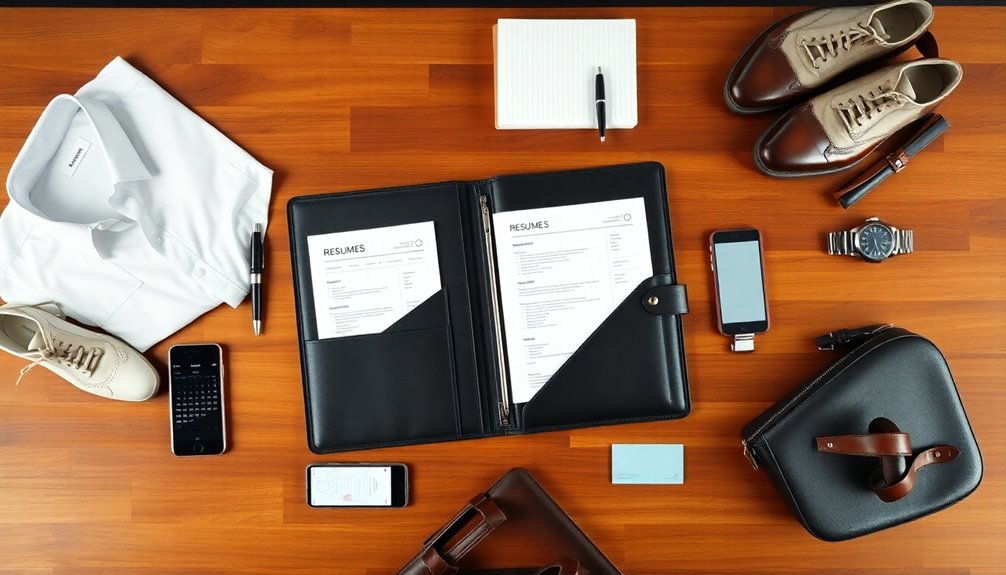
Preparing a strong reference list is essential for making a positive impression during your job interview. A well-organized reference list enhances your credibility and shows you're ready to provide additional information. Here are three key points to take into account when creating your reference list:
- Select Professional Contacts: Include at least three professional contacts who can vouch for your skills and work ethic. Make sure they're individuals who know your work well.
- Gather Contact Information: Each reference should have their full name, designation, company, and up-to-date contact information. Confirm you have their permission to list them, so they're prepared if a potential employer reaches out.
- Describe Your Relationship: It's helpful to provide a brief description of your relationship with each reference. This context gives the interviewer insight into how well you know each other and the relevance of their endorsement.
Office Address and Contact
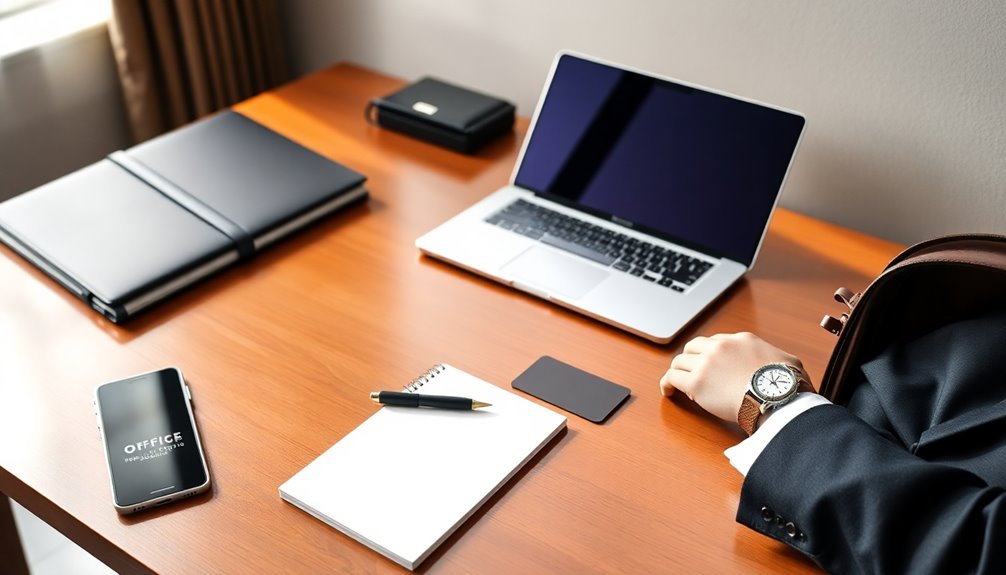
When heading to a job interview, knowing the exact address of the interview location is essential to avoid any confusion or delays. Make certain you've noted down the office address ahead of time. This will help you navigate to the correct place without stress.
Additionally, save the contact information for the office, including phone numbers for reception or the hiring manager. Having this readily available can be a lifesaver if you encounter any issues finding the location, such as construction detours or wrong turns.
Plan your transportation method in advance, whether you're driving, using public transit, or opting for ridesharing. Each method has different considerations, so think about traffic patterns or transit schedules to guarantee timely arrival. Aim to get there at least 10 minutes early to account for any unforeseen delays, like parking difficulties or heavy traffic.
Lastly, carry sufficient cash or a payment method for any potential travel expenses, including parking fees or public transport fares. Being prepared with the office address and contact information will set a positive tone for your interview day!
ID Card
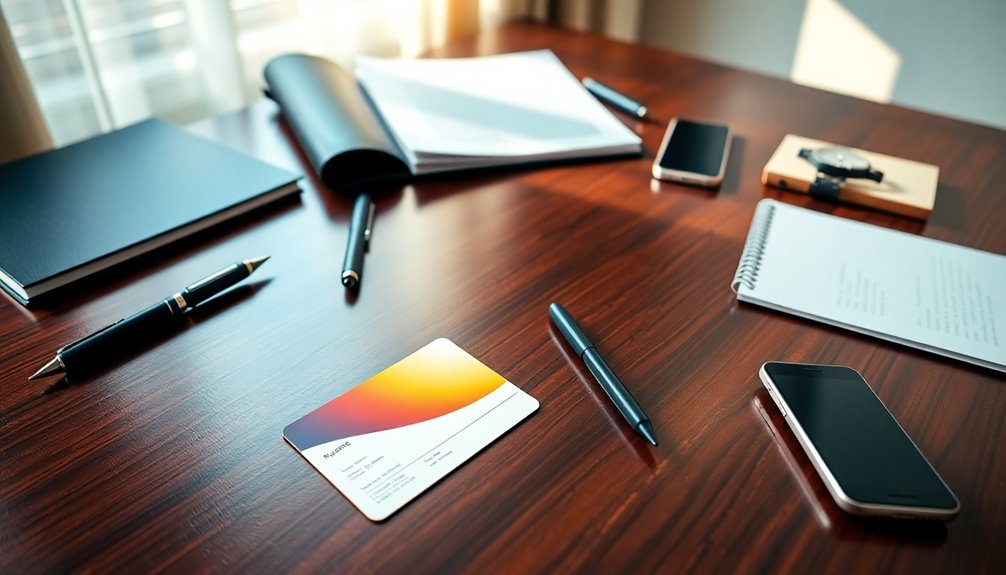
When you head to your job interview, make certain you've got a valid government-issued ID or driver's license on hand. Keep it easily accessible for security checks, and consider having a photocopy tucked away just in case. Double-check that your ID isn't expired to guarantee a smooth entry process.
Valid Identification Required
Often, interviews require you to present valid identification, so it's important to have a government-issued ID or driver's license on hand. This step is vital for security checks at many interview locations. Make certain your ID is valid and easily accessible before the big day to avoid any last-minute issues.
Here are three important details to keep in mind regarding your valid identification required for the interview:
- Confirm Requirements: Some companies may have specific ID requirements, so check these details in advance. This can save you from any surprises at the door.
- Photocopy for Backup: Consider keeping a photocopy of your photo ID. This can be useful in case of loss or if additional identification is needed.
- Check Venue Protocols: Always verify if the interview venue has particular protocols regarding identification. Knowing what to expect guarantees a smooth entry process.
Accessibility for Security Checks
Having your ID card readily accessible is essential for a smooth security check at the interview. Many workplaces require a government-issued ID or driver's license for security clearance, so make sure you have it at hand. You might need to present it as you enter the building, and if it's tucked away in your bag, you could face unnecessary delays.
Before the interview, check the company's specific ID requirements. Some organizations have unique protocols you should be aware of, and knowing these in advance can help you avoid surprises.
Also, confirm that your ID is valid and not expired. An expired ID can lead to complications that you definitely want to avoid on the big day. To further safeguard yourself, consider keeping a photocopy of your ID at home. While you won't need it for security checks, it can be a helpful backup if you lose your ID or if the original isn't accepted for any reason.
Being prepared with your ID not only shows your professionalism but also sets a positive tone for your interview.
Photocopy for Backup
Bringing a photocopy of your government-issued ID or driver's license can save you from potential headaches during your interview. Losing your original identification can lead to unnecessary stress and complications. Having a clear and legible photocopy as a backup guarantees you can quickly provide the necessary identification when needed.
Here are three reasons why carrying a photocopy is essential:
- Quick Verification: A photocopy can expedite the identification process, allowing you to focus on the interview instead of administrative concerns.
- Security Checks: Some interview locations require identification for security purposes. A photocopy helps you breeze through these checks without any hassle.
- Easy Access: Keep the photocopy in a separate section of your folder or bag. This way, you can grab it quickly without rummaging through other documents.
Before heading out, confirm the specific ID requirements of the company. They might need additional forms of identification. By being prepared with a photocopy, you'll guarantee that your interview goes smoothly and that you can present yourself confidently.
List of Questions

Crafting thoughtful questions for your interviewer not only shows your genuine interest in the role but also allows you to gather valuable insights about the company. To prepare for an interview, aim to have at least 3-4 questions ready that demonstrate your research and understanding of the company culture. You might ask about team dynamics or opportunities for professional development, which can lead to a meaningful dialogue.
Focus on questions that address expectations for the role and success metrics. For instance, you could inquire about the key performance indicators for the position or how success is measured within the team. Such questions not only clarify your potential contributions but also reflect your proactive mindset.
Additionally, consider engaging the interviewer by asking about their experiences and perspectives within the company. This approach not only creates a more conversational atmosphere but also helps establish rapport. Remember, the goal is to leave a positive impression that reinforces your enthusiasm for the opportunity. By preparing insightful questions, you not only stand out as a candidate but also gain a clearer understanding of how you can fit into the company's future goals. Incorporating mental clarity techniques can also help you approach the interview with confidence and focus.
Confidence and Positive Attitude

Stepping into an interview with confidence and a positive attitude can make all the difference in how you're perceived by the interviewer. When you project confidence through good posture and eye contact, you create a lasting impression. A positive mindset not only alleviates anxiety but also keeps you engaged in the conversation, fostering a more dynamic exchange.
Here are three tips to help you maintain that confidence and positive attitude:
- Practice Your Answers: Rehearsing your responses to common interview questions helps you articulate your qualifications effectively, making you feel more prepared.
- Visualize Success: Before the interview, take a moment to visualize yourself succeeding. This mental exercise boosts your self-assurance and sets the tone for your performance, similar to how visualization techniques for peak performance are used in sports.
- Use Relaxation Techniques: Practicing deep breathing can help calm your nerves, allowing you to project a composed demeanor.
Approach the interview as a mutual evaluation, expressing genuine enthusiasm for the role. This reinforces your interest and commitment, leaving a positive impression on the interviewer. With confidence and a positive attitude, you're well on your way to making a great impact!
Frequently Asked Questions
What Will I Need to Bring to an Interview?
When you're heading to an interview, you'll want to make a strong impression. Bring multiple copies of your updated resume so everyone can see your qualifications. A printed list of professional references adds credibility, while a portfolio or relevant work samples showcases your skills. Don't forget a government-issued ID for access and a notepad with a pen for notes. Finally, having thoughtful questions ready shows your genuine interest in the position.
Which Should You Always Bring With You to a Job Interview?
Imagine walking into an interview, feeling confident, but then realizing you forgot your resume. You should always bring multiple copies of your updated resume to guarantee every interviewer has access to your qualifications. This simple step can set a positive tone for your meeting. Additionally, having a portfolio or work samples ready can showcase your skills, making a lasting impression on potential employers. Don't overlook these essentials; they can make all the difference.
What Should a 16 Year Old Bring to a Job Interview?
When you're preparing for a job interview at 16, make sure you bring a few key items. Start with multiple copies of your tailored resume and a list of references who can speak to your character. Don't forget a notepad and pen to jot down important notes. If applicable, include a portfolio showcasing your skills. Finally, grab a government-issued or school ID for identification. These essentials will help you make a great impression!
Do I Need to Bring Anything to a Job Interview?
Yes, you should definitely bring a few important items to a job interview. Start with multiple copies of your resume to share with each interviewer. A list of professional references is also helpful, along with a portfolio showcasing your work, if applicable. Don't forget your government-issued ID for building access. Finally, carry a notepad and pen to jot down notes, showing your engagement and interest in the conversation.
Conclusion
In the job interview arena, being prepared is your armor. By bringing along your resume, certificates, and a portfolio, you're equipping yourself for success. Don't forget your ID, a list of questions, and that all-important confidence. With these essentials in hand, you'll shine like a beacon in the dark, guiding potential employers to see your true potential. So gear up and step into that interview ready to impress!
